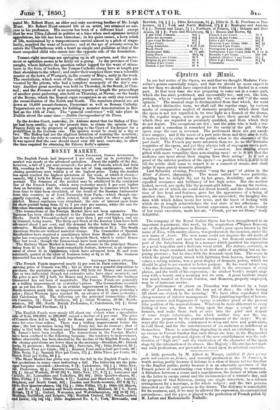Otairto atilt Zulu.
In our last notice of the Opera, we said-hat we thought Madame Frez- zolini's genius essentially tragic, and that we should no more expect to see her than we should have expected to see Siddons or Rachel in a comic part. At that very time she was preparing to come out in a comic part, which she has since performed, and successfully too; and yet, like him, perhaps, who is "convinced against his will," we are still "of the same opinion. " The musical stage is distinguished from that which, for want of a better distinctive term, we shall call the regular stage, 'by various marks of comparative neglect of dramatic pisaniety, which show that the opera is not yet regarded in its true light as a branch of the drama. On the regular stage, actors in general have their special walks for which they are regarded as peculiarly qualified, and from which they do not depart. The exceptions are few ; and the niter who is both a tra- gedian and a comedian is remarked for the raritysof the gift. On the opera stage the case is reversed. The performers there are par excel- lence singers ; and if the music of a part suits them and they ping it well, it matters little to either them or the-public what- is the character of the part itself. The French pay more attention than-we do to -the-dramatic requisites of the opera, and yet they always talk of ranging fln opera part. Such a performer " a chante le role de " so-and-so. .Are. singing actors gifted with more versatility than non-singing ones ? or is it net that the audience care more about their singing than their acting ? Is .3.1 not a proof of the inferior position of the opera ?—a position whickitewill hold
till the public shall cease to regard it as a concert of music, shall judge it upon purely dramatic principles. Last Saturday evening, Frezzolini "sang the part" of Arline in the Elixir d'Amore, charmingly. The music suited her voice perfectly, enabling her to delight the ear by her grace, flexibility, and the un- equalled resonance and brilliancy of her high notes. But she neither looked, moved, nor spoke like the peasant-girl Adina. Among the rustiest, the noble air of which she could not divest herself; and the classical con- tour of her head and features, gave her the appearance of a being of another class. In two points, however, she succeeded ; the haughty dis- dain with which Adina treats her lover, and the burst of feeling with which she at length acknowledges the real state of her affections. In this scene, Frezzolini's earnest, fervent expression, as well as the beauty of her vocal execution, made her air, " Prendi, per me eei libero," truly delightful.


























 Previous page
Previous page